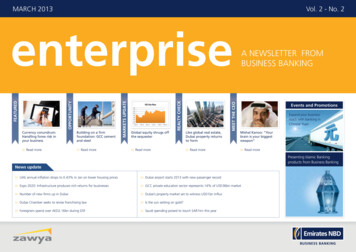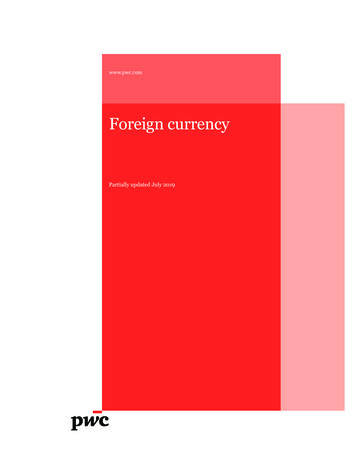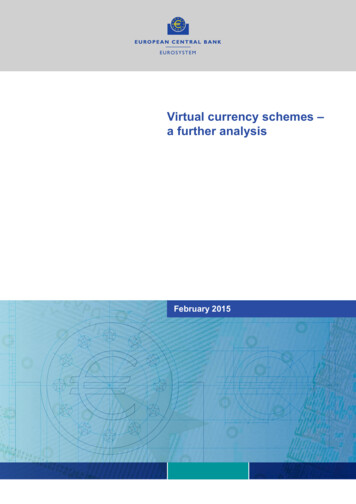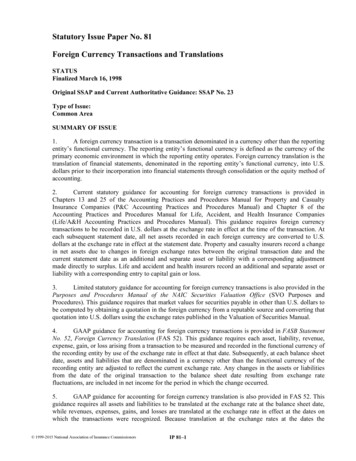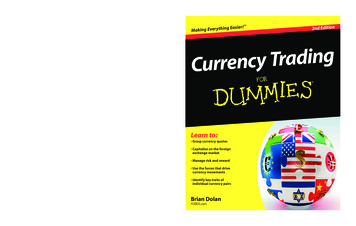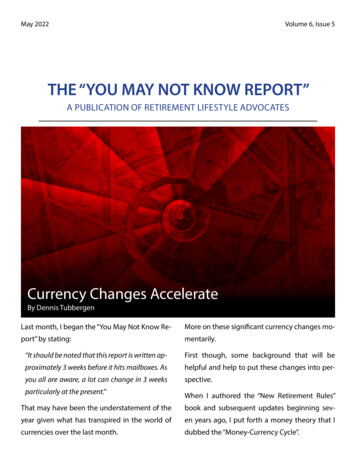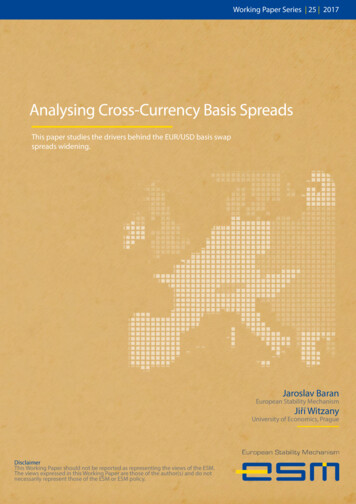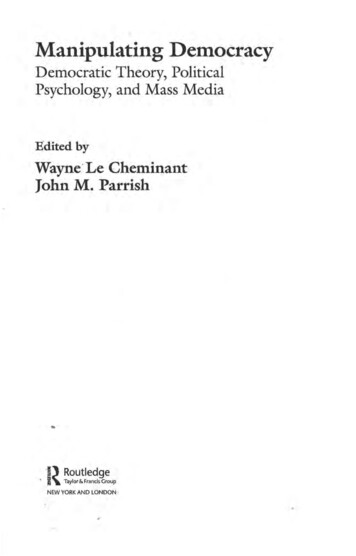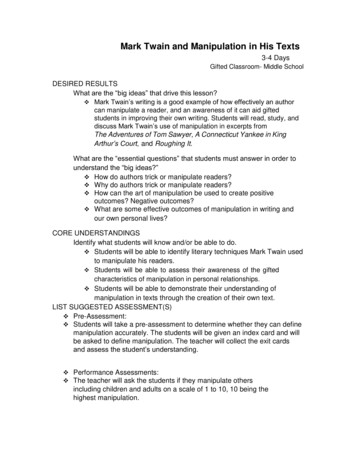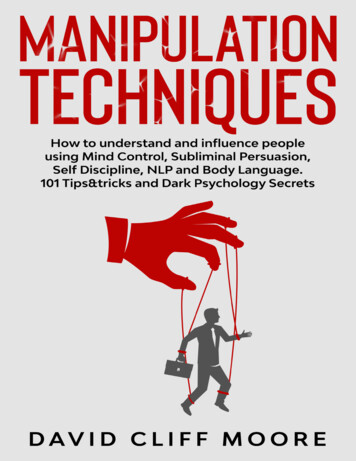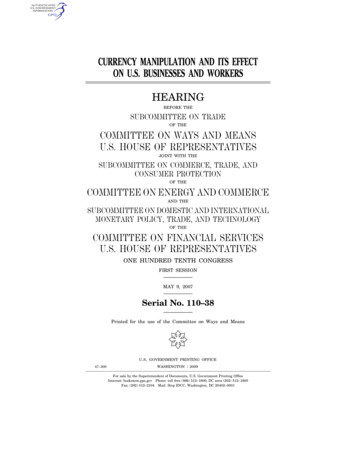
Transcription
CURRENCY MANIPULATION AND ITS EFFECTON U.S. BUSINESSES AND WORKERSHEARINGBEFORE THESUBCOMMITTEE ON TRADEOF THECOMMITTEE ON WAYS AND MEANSU.S. HOUSE OF REPRESENTATIVESJOINT WITH THESUBCOMMITTEE ON COMMERCE, TRADE, ANDCONSUMER PROTECTIONOF THECOMMITTEE ON ENERGY AND COMMERCEAND THESUBCOMMITTEE ON DOMESTIC AND INTERNATIONALMONETARY POLICY, TRADE, AND TECHNOLOGYOF THECOMMITTEE ON FINANCIAL SERVICESU.S. HOUSE OF REPRESENTATIVESONE HUNDRED TENTH CONGRESSFIRST SESSIONMAY 9, 2007Serial No. 110–38Printed for the use of the Committee on Ways and Means(U.S. GOVERNMENT PRINTING OFFICEWASHINGTON47–300:2009wwoods2 on PROD1PC70 with HEARINGFor sale by the Superintendent of Documents, U.S. Government Printing OfficeInternet: bookstore.gpo.gov Phone: toll free (866) 512–1800; DC area (202) 512–1800Fax: (202) 512–2104 Mail: Stop IDCC, Washington, DC 20402–0001VerDate Nov 24 200801:07 Apr 28, 2009Jkt 047300PO 00000Frm 00001Fmt 5011Sfmt 5011E:\HR\OC\A300A.XXXA300A
COMMITTEE ON WAYS AND MEANSCHARLES B. RANGEL, New York, ChairmanFORTNEY PETE STARK, CaliforniaJIM MCCRERY, LouisianaSANDER M. LEVIN, MichiganWALLY HERGER, CaliforniaJIM MCDERMOTT, WashingtonDAVE CAMP, MichiganJOHN LEWIS, GeorgiaJIM RAMSTAD, MinnesotaRICHARD E. NEAL, MassachusettsSAM JOHNSON, TexasMICHAEL R. MCNULTY, New YorkPHIL ENGLISH, PennsylvaniaJOHN S. TANNER, TennesseeJERRY WELLER, IllinoisXAVIER BECERRA, CaliforniaKENNY HULSHOF, MissouriLLOYD DOGGETT, TexasRON LEWIS, KentuckyEARL POMEROY, North DakotaKEVIN BRADY, TexasSTEPHANIE TUBBS JONES, OhioTHOMAS M. REYNOLDS, New YorkMIKE THOMPSON, CaliforniaPAUL RYAN, WisconsinJOHN B. LARSON, ConnecticutERIC CANTOR, VirginiaRAHM EMANUEL, IllinoisJOHN LINDER, GeorgiaEARL BLUMENAUER, OregonDEVIN NUNES, CaliforniaRON KIND, WisconsinPAT TIBERI, OhioBILL PASCRELL, JR., New JerseyJON PORTER, NevadaSHELLEY BERKLEY, NevadaJOSEPH CROWLEY, New YorkCHRIS VAN HOLLEN, MarylandKENDRICK MEEK, FloridaALLYSON Y. SCHWARTZ, PennsylvaniaARTUR DAVIS, AlabamaJANICE MAYS, Chief Counsel and Staff DirectorBRETT LOPER, Minority Staff DirectorSUBCOMMITTEE ON TRADESANDER M. LEVIN, Michigan, Chairmanwwoods2 on PROD1PC70 with HEARINGJOHN S. TANNER, TennesseeJOHN B. LARSON, ConnecticutEARL BLUMENAUER, OregonBILL PASCRELL, JR., New JerseySHELLEY BERKLEY, NevadaJOSEPH CROWLEY, New YorkCHRIS VAN HOLLEN, MarylandKENDRICK MEEK, FloridaWALLY HERGER, CaliforniaJERRY WELLER, IllinoisRON LEWIS, KentuckyKEVIN BRADY, TexasTHOMAS M. REYNOLDS, New YorkKENNY HULSHOF, MissouriiiVerDate Nov 24 200801:07 Apr 28, 2009Jkt 047300PO 00000Frm 00002Fmt 0486Sfmt 0486E:\HR\OC\A300A.XXXA300A
COMMITTEE ON ENERGY AND COMMERCEJOHN D. DINGELL, Michigan, ChairmanHENRY A. WAXMAN, CaliforniaBARON P. HILL, IndianaEDWARD J. MARKEY, MassachusettsJOE BARTON, Texas, Ranking MemberRICK BOUCHER, VirginiaRALPH M. HALL, TexasEDOLPHUS TOWNS, New YorkJ. DENNIS HASTERT, IllinoisFRANK PALLONE JR., New JerseyFRED UPTON, MichiganBART GORDON, TennesseeCLIFF STEARNS, FloridaBOBBY L. RUSH, IllinoisNATHAN DEAL, GeorgiaANNA G. ESHOO, CaliforniaED WHITFIELD, KentuckyBART STUPAK, MichiganBARBARA CUBIN, WyomingELIOT L. ENGEL, New YorkJOHN SHIMKUS, IllinoisALBERT R. WYNN, MarylandHEATHER WILSON, New MexicoGENE GREEN, TexasJOHN SHADEGG, ArizonaDIANA DEGETTE, Colorado, Vice ChairCHARLES W. ‘‘CHIP’’ PICKERING,LOIS CAPPS, CaliforniaMississippiMIKE DOYLE, PennsylvaniaVITO FOSSELLA, New YorkJANE HARMAN, CaliforniaSTEVE BUYER, IndianaTOM ALLEN, MaineGEORGE RADANOVICH, CaliforniaJAN SCHAKOWSKY, IllinoisJOSEPH R. PITTS, PennsylvaniaHILDA L. SOLIS, CaliforniaMARY BONO, CaliforniaCHARLES A. GONZALEZ, TexasGREG WALDEN, OregonJAY INSLEE, WashingtonLEE TERRY, NebraskaTAMMY BALDWIN, WisconsinMIKE FERGUSON, New JerseyMIKE ROSS, ArkansasMIKE ROGERS, MichiganDARLENE HOOLEY, OregonSUE MYRICK, North CarolinaANTHONY D. WEINER, New YorkJOHN SULLIVAN, OklahomaJIM MATHESON, UtahTIM MURPHY, PennsylvaniaG. K. BUTTERFIELD, North CarolinaMICHAEL C. BURGESS, TexasCHARLIE MELANCON, LouisianaMARSHA BLACKBURN, TennesseeJOHN BARROW, GeorgiaDENNIS FITZGIBBONS, Chief of StaffDAVID CAVICKE, Minority Chief of StaffSUBCOMMITTEE ON COMMERCE, TRADE, AND CONSUMER PROTECTIONBOBBY L. RUSH, Illinois, Chairmanwwoods2 on PROD1PC70 with HEARINGJAN SCHAKOWSKY, Illinois, Vice ChairG. K. BUTTERFIELD, North CarolinaJOHN BARROW, GeorgiaBARON P. HILL, IndianaEDWARD J. MARKEY, MassachusettsRICK BOUCHER, VirginiaEDOLPHUS TOWNS, New YorkDIANA DEGETTE, ColoradoCHARLES A. GONZALEZ, TexasMIKE ROSS, ArkansasDARLENE HOOLEY, OregonANTHONY D. WEINER, New YorkJIM MATHESON, UtahCHARLIE MELANCON, LouisianaJOHN D. DINGELL, Michigan (Ex Officio)CLIFF STEARNS, Florida, Ranking MemberJ. DENNIS HASTERT, IllinoisED WHITFIELD, KentuckyCHARLES W. ‘‘CHIP’’ PICKERING,MississippiVITO FOSSELLA, New YorkGEORGE RADANOVICH, CaliforniaJOSEPH R. PITTS, PennsylvaniaMARY BONO, CaliforniaLEE TERRY, NebraskaSUE MYRICK, North CarolinaMICHAEL C. BURGESS, TexasMARSHA BLACKBURN, TennesseeJOE BARTON, Texas (Ex Officio)iiiVerDate Nov 24 200801:07 Apr 28, 2009Jkt 047300PO 00000Frm 00003Fmt 0486Sfmt 0486E:\HR\OC\A300A.XXXA300A
COMMITTEE ON FINANCIAL SERVICESBARNEY FRANK, Massachusetts, ChairmanPAUL E. KANJORSKI, PennsylvaniaMAXINE WATERS, CaliforniaCAROLYN B. MALONEY, New YorkLUIS V. GUTIERREZ, IllinoisNYDIA M. VELAZQUEZ, New YorkMELVIN L. WATT, North CarolinaGARY L. ACKERMAN, New YorkJULIA CARSON, IndianaBRAD SHERMAN, CaliforniaGREGORY W. MEEKS, New YorkDENNIS MOORE, KansasMICHAEL E. CAPUANO, MassachusettsRUBEN HINOJOSA, TexasWILLIAM LACY CLAY, MissouriCAROLYN MCCARTHY, New YorkJOE BACA, CaliforniaSTEPHEN F. LYNCH, MassachusettsBRAD MILLER, North CarolinaDAVID SCOTT, GeorgiaAL GREEN, TexasEMANUEL CLEAVER, MissouriMELISSA L. BEAN, IllinoisGWEN MOORE, WisconsinLINCOLN DAVIS, TennesseeALBIO SIRES, New JerseyPAUL W. HODES, New HampshireKEITH ELLISON, MinnesotaRON KLEIN, FloridaTIM MAHONEY, FloridaCHARLES WILSON, OhioED PERLMUTTER, ColoradoCHRISTOPHER S. MURPHY, ConnecticutJOE DONNELLY, IndianaROBERT WEXLER, FloridaJIM MARSHALL, GeorgiaDAN BOREN, OklahomaSPENCER BACHUS, AlabamaRICHARD H. BAKER, LouisianaDEBORAH PRYCE, OhioMICHAEL N. CASTLE, DelawarePETER KING, New YorkEDWARD R. ROYCE, CaliforniaFRANK D. LUCAS, OklahomaRON PAUL, TexasSTEVEN C. LATOURETTE, OhioDONALD A. MANZULLO, IllinoisWALTER B. JONES, North CarolinaJUDY BIGGERT, IllinoisCHRISTOPHER SHAYS, ConnecticutGARY G. MILLER, CaliforniaSHELLEY MOORE CAPITO, West VirginiaTOM FEENEY, FloridaJEB HENSARLING, TexasSCOTT GARRETT, New JerseyGINNY BROWN–WAITE, FloridaJ. GRESHAM BARRETT, South CarolinaJIM GERLACH, PennsylvaniaSTEVAN PEARCE, New MexicoRANDY NEUGEBAUER, TexasTOM PRICE, GeorgiaGEOFF DAVIS, KentuckyPATRICK T. MCHENRY, North CarolinaJOHN CAMPBELL, CaliforniaADAM PUTNAM, FloridaMICHELE BACHMANN, MinnesotaPETER J. ROSKAM, IllinoisKENNY MARCHANT, TexasTHADDEUS MCCOTTER, MichiganKEVIN MCCARTHY, CaliforniaJEANNE ROSLANOWICK, Staff DirectorLARRY LAVENDER, Minority Staff DirectorSUBCOMMITTEE ON DOMESTIC AND INTERNATIONAL MONETARYPOLICY, TRADE, AND TECHNOLOGYLUIS V. GUTIERREZ, Illinois, Chairmanwwoods2 on PROD1PC70 with HEARINGCAROLYN B. MALONEY, New YorkMAXINE WATERS, CaliforniaPAUL E. KANJORSKI, PennsylvaniaBRAD SHERMAN, CaliforniaGWEN MOORE, WisconsinGREGORY W. MEEKS, New YorkDENNIS MOORE, KansasWILLIAM LACY CLAY, MissouriKEITH ELLISON, MinnesotaCHARLES WILSON, OhioROBERT WEXLER, FloridaJIM MARSHALL, GeorgiaDAN BOREN, OklahomaRON PAUL, TexasMICHAEL N. CASTLE, DelawareFRANK D. LUCAS, OklahomaSTEVEN C. LATOURETTE, OhioDONALD A. MANZULLO, IllinoisWALTER B. JONES, North CarolinaJEB HENSARLING, TexasTOM PRICE, GeorgiaPATRICK T. MCHENRY, North CarolinaMICHELE BACHMANN, MinnesotaPETER J. ROSKAM, IllinoisKENNY MARCHANT, TexasPursuant to clause 2(e)(4) of Rule XI of the Rules of the House, public hearing recordsof the Committee on Ways and Means are also published in electronic form. The printedhearing record remains the official version. Because electronic submissions are used toprepare both printed and electronic versions of the hearing record, the process of convertingbetween various electronic formats may introduce unintentional errors or omissions. Such occurrences are inherent in the current publication process and should diminish as the processis further refined.ivVerDate Nov 24 200801:07 Apr 28, 2009Jkt 047300PO 00000Frm 00004Fmt 0486Sfmt 0486E:\HR\OC\A300A.XXXA300A
CONTENTSPageAdvisory of May 2, 2007, announcing the hearing .2WITNESSESThe Honorable Donald L. Evans, Chief Executive Officer, Financial ServicesForum .M. Brian O’Shaughnessy, President and Chief Executive Officer, Revere Copper Products, Inc., Rome, New York .Stephen S. Roach, Ph.D., Managing Director and Chief Global Economist,Morgan Stanley, New York, New York .C. Fred Bergsten, Ph.D., Director, Peterson Institute for International Economics .Mustafa Mohatarem, Ph.D., Chief Economist, General Motors Corp., Detroit,Michigan .Thea M. Lee, Policy Director, American Federation of Labor and Congressof Industrial Organizations .William Hickey, President, Lapham-Hickey Steel Corp., Chicago, Illinois .The Honorable Mark Sobel, Deputy Assistant Secretary for InternationalMonetary and Financial Policy, U.S. Department of Treasury .The Honorable Stephen Claeys, Deputy Assistant Secretary for Antidumpingand Countervailing Duty Operations, Department of Commerce .The Honorable Daniel Brinza, Assistant U.S. Trade Representative for Monitoring and Enforcement, Office of the U.S. Trade Representative .1521354248606699104107SUBMISSIONS FOR THE RECORDwwoods2 on PROD1PC70 with HEARINGAmerican Foundry Society, letter .Retail Industry Leaders Association, statement .vVerDate Nov 24 200801:07 Apr 28, 2009Jkt 047300PO 00000Frm 00005Fmt 0486Sfmt 0486E:\HR\OC\A300A.XXXA300A127129
wwoods2 on PROD1PC70 with HEARINGVerDate Nov 24 200801:07 Apr 28, 2009Jkt 047300PO 00000Frm 00006Fmt 0486Sfmt 0486E:\HR\OC\A300A.XXXA300A
CURRENCY MANIPULATION AND ITS EFFECTON U.S. BUSINESSES AND WORKERSWEDNESDAY, MAY 9, 2007U.S. HOUSE OF REPRESENTATIVES,COMMITTEE ON WAYS AND MEANS,SUBCOMMITTEE ON TRADE, JOINT WITHCOMMITTEE ON ENERGY AND COMMERCE,SUBCOMMITTEE ON COMMERCE, TRADE, ANDCONSUMER PROTECTION, ANDwwoods2 on PROD1PC70 with HEARINGCOMMITTEE ON FINANCIAL SERVICES,SUBCOMMITTEE ON DOMESTIC AND INTERNATIONALMONETARY POLICY, TRADE AND TECHNOLOGYWashington, DC.The Subcommittees met, pursuant to notice, at 9:39 a.m., inroom 1100, Longworth House Office Building, Hon. Sander Levin(Chairman of the Subcommittee on Trade, Committee on Ways andMeans) presiding.[The advisory announcing the hearing follows:](1)VerDate Nov 24 200801:07 Apr 28, 2009Jkt 047300PO 00000Frm 00007Fmt 6633Sfmt 6633E:\HR\OC\A300A.XXXA300A
2ADVISORYFROM THE COMMITTEE ON WAYS AND MEANSSUBCOMMITTEE ON TRADEFOR IMMEDIATE RELEASEMay 02, 2007TR–4CONTACT: (202) 225–6649Chairman Sander M. Levin Today AnnouncedA Tri-Partite Subcommittee Hearing OnCurrency Manipulation and Its Effects onU.S. Business and WorkersWays and Means Trade Subcommittee Chairman Sander M. Levin today announced a tri-partite subcommittee hearing on currency manipulation and its effectson U.S. business and workers. Three subcommittees will participate in the hearing:the Ways and Means Subcommittee on Trade; the Financial Services Subcommitteeon Domestic and International Monetary Policy, Trade, and Technology; and the Energy and Commerce Subcommittee on Commerce, Trade and Consumer Protection.The hearing will take place on Wednesday, May 9, in the main Ways andMeans Committee hearing room, 1100 Longworth House Office Building,beginning at 9:30 a.m.In view of the limited time available to hear witnesses, oral testimony at thishearing will be heard from invited witnesses only. However, any individual or organization not scheduled for an oral appearance may submit a written statement forconsideration by the three Subcommittees and for inclusion in the printed record ofthe hearing.FOCUS OF THE HEARING:The purpose of this hearing is to consider: (1) whether, and to what extent, theChinese renminbi (RMB) and the Japanese yen are undervalued as a result of foreign government intervention in the currency markets; (2) the immediate and longterm impact an undervalued RMB or yen has on the economies of the United Statesand other countries and on the global economy; and (3) what action, if any, theUnited States should take to address exchange rate manipulation.BACKGROUND:Over the past several years, economists and U.S. stakeholders have expressedgrowing concern regarding the value of the RMB and the yen, and the role of theChinese and Japanese governments in determining those values.wwoods2 on PROD1PC70 with HEARINGFor over ten years, China has fixed its exchange rate by intervening in currencymarkets. Economists have estimated that the RMB is undervalued by at least 9.5percent and by as much as 54 percent, according to a recent survey by the Congressional Research Service. In July 2005, China began to allow the RMB to appreciate,and it has appreciated 7.3 percent since then. Nevertheless, in December 2006, U.S.Federal Reserve Chairman Ben Bernanke stated that the currency situation ‘‘haslikely worsened recently,’’ as the RMB’s trade-weighted effective real exchange ratehas fallen about 10 percent over the past five years. He described the Governmentof China’s currency policies as a ‘‘subsidy to exports’’ from China. The Governmentof China must accumulate foreign exchange reserves to maintain the fixed exchangerate. As a result, the Government of China today holds more than 1.2 trillion inforeign exchange reserves—more than any other country in history. (U.S. government foreign exchange reserves are approximately 69 billion.)VerDate Nov 24 200801:07 Apr 28, 2009Jkt 047300PO 00000Frm 00008Fmt 6633Sfmt 6621E:\HR\OC\A300A.XXXA300A
3Although Japan has not formally intervened in its currency market since 2004,the Japanese yen has been described by The Economist magazine recently as ‘‘perhaps the world’s most undervalued currency.’’ This year the trade-weighted valueof the yen fell to its lowest level in more than 30 years. J.P. Morgan recently estimated that the yen was 14 percent undervalued relative to the U.S. dollar. As aresult of currency interventions in the recent past, the Government of Japan nowholds over 900 billion in reserves, the second highest level in the world.In 2006, the U.S. goods trade deficit with China was 232.5 billion (a worldrecord) and 88.4 billion with Japan. An undervalued RMB or yen could contributeto these deficits, although other factors, including disparities in personal savingsrates, also may play a role.The Omnibus Trade and Competitiveness Act of 1988 (P.L. 100–418) requires theSecretary of the Treasury to determine whether foreign countries manipulate theirexchange rate with the U.S. Dollar for the purpose of ‘‘gaining unfair competitiveadvantage in international trade.’’ Such a finding would require the Treasury Secretary to initiate negotiations on an ‘‘expedited basis’’ for the purpose of eliminatingthe unfair advantage. The Treasury Department has repeatedly declined to find thateither China or Japan manipulates the rate of exchange. The Treasury Departmentwas required to submit its most recent report to Congress on international economicand exchange rate policies on April 15, 2007. That report has not yet been submitted to Congress.The Office of the U.S. Trade Representative (USTR) also has decided not to investigate China’s currency practices under Section 301 of the Trade Act of 1974, or toinitiate a World Trade Organization (WTO) case to address these practices. In September 2004, members of the public (the ‘‘China Currency Coalition’’) and severalMembers of Congress requested a Section 301 investigation. USTR refused the request, stating that an investigation would be counterproductive to Treasury’s effortstoward achieving a more flexible, market-based exchange rate for the RMB. Members of Congress filed another petition seven months later, in April 2005. USTRagain declined to accept the petition, but acknowledged that ‘‘China is now readyto move toward a flexible, market-based exchange rate and should move withoutdelay in a manner and magnitude that is sufficiently reflective of underlying marketconditions.’’ In December 2006, Chairman Bernanke again called for a ‘‘greaterscope for market forces to determine the value of the RMB’’.The Administration has engaged China on the currency issue under the ‘‘StrategicEconomic Dialogue’’ (SED). The first SED took place in Beijing in December. Thenext SED will begin in Washington, D.C., on May 23, 2007.‘‘This is an innovative hearing to address the serious problem posed bycurrency manipulation,’’ stated Trade Subcommittee Chairman Levin, inannouncing the hearing. ‘‘Currency manipulation places American workers, farmers and businesses at a competitive disadvantage and this Congress will work with the Administration to hold trading partners accountable to the rules of trade.’’wwoods2 on PROD1PC70 with HEARINGDETAILS FOR SUBMISSION OF WRITTEN COMMENTS:Please Note: Any person(s) and/or organization(s) wishing to submit for the hearing record must follow the appropriate link on the hearing page of the Committeewebsite and complete the informational forms. From the Committee homepage,http://waysandmeans.house.gov, select ‘‘110th Congress’’ from the menu entitled,‘‘Committee Hearings’’ ss [18]).Select the hearing for which you would like to submit, and click on the link entitled,‘‘Click here to provide a submission for the record.’’ Once you have followed the online instructions, completing all informational forms and clicking ‘‘submit’’ on thefinal page, an email will be sent to the address which you supply confirming yourinterest in providing a submission for the record. You MUST REPLY to the emailand ATTACH your submission as a Word or WordPerfect document, in compliancewith the formatting requirements listed below, by close of business Wednesday,May 23, 2007. Finally, please note that due to the change in House mail policy,the U.S. Capitol Police will refuse sealed-package deliveries to all House OfficeBuildings. For questions, or if you encounter technical problems, please call (202)225–1721.VerDate Nov 24 200801:07 Apr 28, 2009Jkt 047300PO 00000Frm 00009Fmt 6633Sfmt 6621E:\HR\OC\A300A.XXXA300A
4FORMATTING REQUIREMENTS:The Committee relies on electronic submissions for printing the official hearing record. Asalways, submissions will be included in the record according to the discretion of the Committee.The Committee will not alter the content of your submission, but we reserve the right to formatit according to our guidelines. Any submission provided to the Committee by a witness, any supplementary materials submitted for the printed record, and any written comments in responseto a request for written comments must conform to the guidelines listed below. Any submissionor supplementary item not in compliance with these guidelines will not be printed, but will bemaintained in the Committee files for review and use by the Committee.1. All submissions and supplementary materials must be provided in Word or WordPerfectformat and MUST NOT exceed a total of 10 pages, including attachments. Witnesses and submitters are advised that the Committee relies on electronic submissions for printing the officialhearing record.2. Copies of whole documents submitted as exhibit material will not be accepted for printing. Instead, exhibit material should be referenced and quoted or paraphrased. All exhibit material not meeting these specifications will be maintained in the Committee files for review anduse by the Committee.3. All submissions must include a list of all clients, persons, and/or organizations on whosebehalf the witness appears. A supplemental sheet must accompany each submission listing thename, company, address, telephone and fax numbers of each witness.Note: All Committee advisories and news releases are available on the WorldWide Web at http://waysandmeans.house.gov.The Committee seeks to make its facilities accessible to persons with disabilities.If you are in need of special accommodations, please call 202–225–1721 or 202–226–3411 TTD/TTY in advance of the event (four business days notice is requested).Questions with regard to special accommodation needs in general (including availability of Committee materials in alternative formats) may be directed to the Committee as noted above.wwoods2 on PROD1PC70 with HEARINGfChairman LEVIN. I think we will start. If everybody could taketheir seats, we are a couple minutes late.This is the first of two hearings, the first scheduled for thismorning at 9:30, and there are two for seven witnesses. Then at2:00 o’clock we will reconvene to hear from three representativesof the administration. So hopefully all of us will be able to return,because we want very much to get the reactions of the administration, the Assistant Secretaries of Treasury, Commerce and USTR,to the testimony that we have all heard this morning.As you can see, this is a rather unusual hearing. I don’t knowthat we have held a hearing with three Subcommittees before.What we are going to do is ask the chair and the ranking of eachof the three to make a brief opening statement. I know the practicehas varied Committee to Committee.But I hope it is acceptable that everybody else who has an opening statement will submit them for the record. If there is no objection, we will proceed on that basis.Then after the opening statements, we will proceed with the witnesses.In the case of Energy and Commerce, Mr. Rush will be recognized and he will have the privilege of yielding to the Chairmanof the Committee.This, as I said, is an unusual hearing, three Subcommittees. Thereason why is because this is an exceptional issue. There clearly isan exceptional problem.VerDate Nov 24 200801:07 Apr 28, 2009Jkt 047300PO 00000Frm 00010Fmt 6633Sfmt 6602E:\HR\OC\A300A.XXXA300A
wwoods2 on PROD1PC70 with HEARING5We have unusual trade balances. We have unusual reserves heldby two countries, historic, two trillion plus among them. We alsohave currencies that virtually everybody acknowledges are verymuch undervalued.We have had in the case of China statements that they weregoing to take steps. But today, in part because of their intervention, it is not the only reason. In real dollar terms, the valuationproblem remains the same.With Japan, we have a somewhat different situation, in thesense that for the last years there hasn’t been direct governmentintervention. But what we have had are government policies leading to the same situation. For example, The Economist magazinerecently said that the yen was perhaps the world’s most undervalued currency.I close by just saying, and we will have testimony as to this, thishas had real life impact on the United States, on its businesses andon its workers.I met several weeks ago with companies, most of them small andmiddle size companies, often family-owned, in the fiber business.The raw materials that they use are essentially the same throughout the world. The cost to them is essentially the same. But whathas happened is that there has been an influx and often the costof the final product is about the same in those cases of imports asthe cost of the original resource. These companies made it clearthat one of the problems was the undervaluation of the currenciesin the countries with whom they are dealing.So, we have called this unique hearing. Someone asked has ithappened before, and Mr. Dingell has been here the longest, andI don’t think he can remember when there were three Subcommittees holding a hearing together. It is because of the importance ofthe problem and the fact that it hasn’t been resolved.We are today where we were years ago. We need to consider thenext steps by the administration and also next steps that we cantake legislatively. So, this is the real thing, this hearing, to get ata real problem leading hopefully to real action.Mr. Herger, for your opening statement. Mr. Herger is rankingon the Subcommittee on Trade.Mr. HERGER. Thank you, Chairman Levin. Today’s issue ismultifaceted. Yes, China’s currency is unacceptably undervalued,which makes our exports less competitive. Yes, we run a largetrade deficit with China because we import more from China thanwe export there. But although we demand more from China, werecognize that China’s financial institutions are too fragile for usto reasonably expect an immediate, market-driven reevaluation ofthe RMB.Japan’s presence presents an easier challenge. The yen is weak,but Japan has not overtly intervened since 2004. Secretary Paulsonhas stated that the yen’s value naturally reflects Japan’s sluggisheconomy, not government policy.As for the deficits, currency is not the lone culprit. Americanshave been overspending and undersaving. In China and Japan, itis the reverse. We have created huge import demand in UnitedStates both for inexpensive consumer goods and manufacturing inputs which has kept inflation in check and provided our companiesVerDate Nov 24 200801:07 Apr 28, 2009Jkt 047300PO 00000Frm 00011Fmt 6633Sfmt 6602E:\HR\OC\A300A.XXXA300A
wwoods2 on PROD1PC70 with HEARING6with inputs needed to stay competitive, but has also fueled the deficit.We can improve the deficit, not so much by curtailing our imports but by increasing demand for our exports, working with theChinese and Japanese to reduce savings and increase consumptionof our goods.We also need to work with China to develop its financial servicesso that it can float its currency. The administration has made someprogress, but more is needed. I hope that the SED talks later thismonth will bring us further progress.But the lingering, more difficult question is, what do we do in thenear term to address currency and undervaluation? Our approachmust weigh the risks of too rapid a change in currency policy anddomestic risks for the Chinese economy against the problems inherent in an exchange rate that is not market based.My fear is that we force the Chinese to create a more flexiblecurrency, we get what we have asked for, and then we see littleor no impact on U.S. jobs or exports. Former Federal ReserveChairman Greenspan shares this concern.Given the complexities, perhaps it is easier to start with what weought not to do. Some may say a retaliatory tariff is the solution.But retaliation should be a last resort, and I don’t think we’rethere yet. We need to think carefully and act constructively.I can’t help but recall the overbroad Smoot-Hawley tariffs of1930, which caused a drastic decline in international trade andcontributed to the Great Depression. These tariffs and other beggar-thy-neighbor policies eroded trust among nations when international cooperation was needed most.Both for economic and political purposes, we in Congress oweU.S. businesses and workers more than merely throwing up ourhands in frustration, slapping punitive tariffs on imports and thenmoving on to the next problem. For starters, we need to insist thatChina comply with its WTO obligations, especially subsidies andintellectual property. We need to implement more export promotionprograms for our small and medium-size enterprises. We need toallocate more resources to streamline the visa process for our Chinese customers and partners. Finally, we need to help the Chineseset technical standards that our companies can meet.Let us focus on the total picture. This is too important to let ourfrustration get the better of us.Chairman LEVIN. Thank you. Mr. Gutierrez.Chairman GUTIERREZ. Good morning, Chairman Levin. I wantto thank you for agreeing to convene and host this hearing, and Iwould like to thank Chairman Rush for your participation and forhelping me ensure that we put a Chicago stamp on the proceedings.This format is certainly unconventional but I think it’s appropriate to highlight the difficult and unconventional problem we facein addressing currency misalignment or manipulation by China orJapan.For the American economy and the American worker, currencyundervaluation by China in particular is reaching critical mass.For over 10 years, China has fixed its exchange rate by interveningin currency markets. Economists estimate that the RMB or yuanVerDate Nov 24 200801:07 Apr 28, 2009Jkt 047300PO 00000Frm 00012Fmt 6633Sfmt 6602E:\HR\OC\A300A.XXXA300A
wwoods2 on PROD1PC70 with HEARING7is undervalued by at least 9.5 percent and by as much as 54 percent. Many economists, including Federal Reserve ChairmanBernanke, characterize this underevaluation as a subsidy for exports from China.We will hear from our witnesses on today’s first panel about theimpact of this subsidy on Chinese goods has on the U.S. economy,and the American worker. Suffice it to say, we cannot compete withthis kind of ongoing government subsidy and we cannot continuedown the path with our second largest trading partner, because theimbalance hurts U.S. workers and businesses and threatens thelong-term stability of our economy and our relationships.In 2006, the U.S. goods trade deficit with China rose by almost15 percent to nearly 233 billion, a historic high. Meanwhile, because the Chinese government must buy U.S. dolla
(1) currency manipulation and its effect on u.s. businesses and workers wednesday, may 9, 2007 u.s. house of representatives, committee on ways and means, subcommittee on trade, joint with committee on energy and commerce, subcommittee on commerce, trade, and consumer protection, and committee on financial services, subcommittee on domestic and international monetary policy, trade and technology
